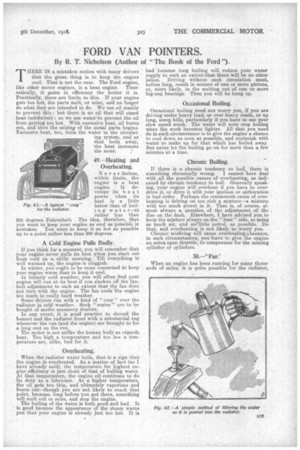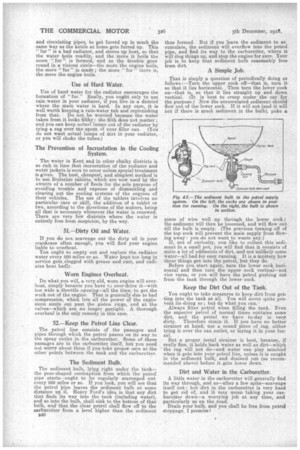FORD VAN POINTERS.
Page 17

Page 18

If you've noticed an error in this article please click here to report it so we can fix it.
By R. T. Nicholson (Author of "The Book of the Ford ").
THERE IS a mistaken notion with many drivers that the great thing is to keep the engine cool. That is not the case. The Ford engine, like other motor engines, is a heat engine. Theoretically, it gains in. efficiency the hotter it is. Practically, there are limits to this. If your engine gets too hot, the parts melt, or seize, and no longer do what they are intended to do. We use oil mainly to prevent this ; but there is no oil that will stand heat indefinitely : so we use water-to prevent the oil from getting too hot. With excessive heat, oil burns out, and then the seizing of the metal parts begins. Excessive heat, too, boils the water in the circulating system, and as that boils away, the heat increases
the more. ,
49.—Heating and Overheating.
N ev er theless, within limits, the engine is a heat engine. . It develops its best power when. its heat is a little below that of boiling water—at . rather less than 200 degrees Fahrenheit. The idea, therefore, that you want to keep your engine as cool as possible is mistaken. You want to keep it as hot as possible up to a point rather less than 200 degrees.
A Cold Engine Pulls Badly.
If you think far a moment, you will remember that your engine never pulls its best when you start out from cold on a chilly morning. Till everything -is well warmed up, the engine is sluggish. In winter, you ought to be more concerned to keep your engine warm than to keep it cool. In bitterly cold weather, you will often find your i engine will run at its best f you slacken off the fanbelt adjustment to such an extent that the fan does not turn with the engine. The fan cools The engine too much in really hard weather. Some drivers run with a kind of "cozy" over the radiator in cold weather. Such " cosies ' are to be bought of motZar accessory dealers. In any event, it is good practice to shroud the bonnet and the radiator front with a substantial rug whenever the van (and the engine) are brought to for a long rest on the run. The motor is not unlike the human body as regards heat. Too high a temperature and too low a temperature are, alike, bad for it.
' Overheating.
When the radiator water boils, that is a sign that the engine is overheated. As a matter of fact (as I have already said), the temperature for highest engine efficiency is just short of that of boiling water. At that temperature, the engine oil continues to do its duty as a lubricant. At a higher temperature, the oil gets too thin, and ultimately vaporizes and burns out—though you are not likely to reach that point, because, long before you get there, something will melt out or seize, and stop the engine. The boiling of the water is both good and bad. It IS good because the appearance of the steam warns you that your engine is already just too hot It is bad because long boiling will reduce your water supply to such an extent 'that there will be no circulation. Driving without such circulation must, before long, result in seizure of one or more pistons, or, more likely, in the melting out of one or more big-end bearings. Then you will be hung up.
Occasional Boiling.
Occasional boiling need not worry you, if you are driving ainder heavy load, or over heavy roads, or up long, steep hills, particularly if you have to use your slow speed much. The water will soon stop boiling when the work becomes lighter. All that you need do in such circumstance is to give the engine a chance to cool down as soon as possible, and replenish with water to make up for that which has boiled away. But never let the boiling go on for more than a few minutes at a time.
Chronic Boiling.
If there is a chronic tendency to boil, there is something chronically wrong. I cannot here deal with all the possible causes of overheating, as indicated by chronic tendency to boil. Generally speaking, your engine will overheat if you have to overdrive it., or drive it with your ignition or carburation in bad order. Perhaps the commonest cause of overheating is driving on too rich a. mixture—a mixture with too mach petrol in it. That is, of course, almost always a, question of the adjustment of the disc on the dash. Elsewhere, I have advised you to keep the mixture always on the "lean" side, so using as much air, and asnittle petrol, as possible. Do that, and overheating is not likely to worry you. Chronic misfiring will cause overheatingAbecause, in such circumstances, you 'have to give the engine an extra open throttle, to compensate for the missing cylinder or cylinders.
50.—" Fur.'
When an engine has been running for many thousands of miles, it is quite possible for the radiator, and circulating pipes, to get furred up in much the same way as the kettle at home gets furred up. This " fur" is a bad radiator, and stores up heat, so that the water boils readily, and the more it boils the more " fur " is formed, and so the trouble goes round in a vicious circle—the more the engine boils, the more "fur" is made; the more " fur " there is, the more the engine boils.
Use of Hard Water.
Use of hard water for the radiator encourages the formation of "fur." Really, you ought only to use rain water in your radiator, if you live in a district where the main, water is hard. In any case, it is well worth keeping a rain-water tub and replenishing from that. Do not be worried because the water taken from it looks filthy : the filth does not matter ; and you can keep actual lumps out of the radiator by tying a rag over tne apont of your filler can. (You do not want actual lumps of dirt in your radiator, or you will choke the tubes.)
The Prevention of Incrustation in the Cooling System. •
The water in Kent and in other chalky districts is so rich in lime that incrustation of the radiator and water jackets is sure to occur unless special treatment is given. The best, cheapest, and simplest method is to use Boilerine tablets, which are now used by the owners of a number of fleets for the sole purpose of avoiding trouble and expense of dismantling and clearing out the cooling systems of the engines of their 'vehicles. The use of the tablets involves no particular care or skill, the addition of a tablet or two, according to the directions of the makers, being all that is necessary whenever the water is renewed. There are very few districts where the water 18 entirely free from suspicion, by the way.
51.—Dirty Oil and Water.
If you do not scavenge out the dirty oil in your crankcase often enough, you will find your engine liable to overheat.
You ought to empty out and replace the radiator water every 500 miles or so. Water kept too long in service gets clogged with grease and rust, and radiates heat badly.
Worn Engines Overheat.
Do what you will, a very old, worn engine will overheat, simply because you have to over-drive it--with too wide a throttle opening—all the time, to get the work out of the engine. That is generally due to bad compression, which lets all the power of the explosions sizzle out past the piston rings, and at the valves--which are no longer gastight. A. thorough overhaul is the only remedy in this case.
'52.—Keep the Petrol Line Clear.
The petrol line consists of the passages and pipes through which the petrol passes on its way to the spray outlet in the carburetter. Some of these passages are in the carburetter itself, but you need not worry about them if you-take proper care at the other points between the tank and the carburetter.
The Sediment Bulb.
The sediment bulb, lying right under the tank— the pear-shaped contraption from which the petrol pipe starts—ought to be regularly scavenged out every 500 miles or 80. If you look, you will see that the petrol Pipe leaves the sediment bulb at some distance up it. Henry Ford's idea is that any dirt that finds its way into the tank (including water), and so into the bulb, shall sink to the bottom of that bulb, and that the• clear petrol shall flow off to the carburetter from a level higher than the sediment B40
thus formed. But if you leave the sediment to ac cumulate, the sediment will overflow into the petrol pipe, and find its way to the carburetter, where it will clog things up, and stop the engine for sure. 'Your job is to keep that sediment bulb reasonably free from dirt.
A Simple Job.
That is simply a question of periodically doing as follows :—Turn the upper cock off—that is, turn it so that it lies horizontal.. Then turn the lower cock on—that is, so that it lies straight up and down vertical. (It is best to creep under the ear for the purpose.) Now the accumulated sediment should flow out of the lower cock. If it will not (and it will not if there is izauch sediment in the bulb), poke a
piece of wire well up through the lower cock ; the sediment will then be loosened, and will flow out till the bulb is empty. (The previous turning off of the top cock will prevent the main supply from flowing away : you do not want to waste any.)
If, out of curiosity, you like to collect this sediment in a small pot, you will find that it consists of quite a lot of oddments of dirt, and not unlikely some -water—all bad for easy running. It is a mystery how these things get into the petrol, but they do. Before you start again, turn the lower cock horizontal and then turn the upper cock vertical—not vice versa, or you will have the petrol gushing out from the tank through the lower cock.
Keep the Dirt Out of the Tank.
You ought to take measures to keep dirt from getting into the tank at all. You will never quite prevent its doing so ; but do what you can.' Always filter petrol when filling the tank. Even the superior petrol of normal times contains some dirt, and the petrol we have to-day isvery dirty. Therefore strain it. If you have no better strainer at hand, use a sound piece of rag, either tying it over the can outlet, or laying it in your funnel.
But a proper metal strainer is best, because, if really fine, it holds back water as well as dirt—which the rag will not do—and water can play mischief when it gets into your petrol line, unless it is caught in the sediment bulb, and drained out (as recommended above) before it gets lower down.
Dirt and Water in the Carburetter.
A little water in the carburetter will generally find its way through, and so—after a few spits—scavenge itself out: but dirt in the carburetter is very hard to get rid of, and it may mean taking your carburetter down—a worrying job at any time, and particularly so on the road. Drain your bulb, and you shall be free from petrol stoppage, I promise I






















